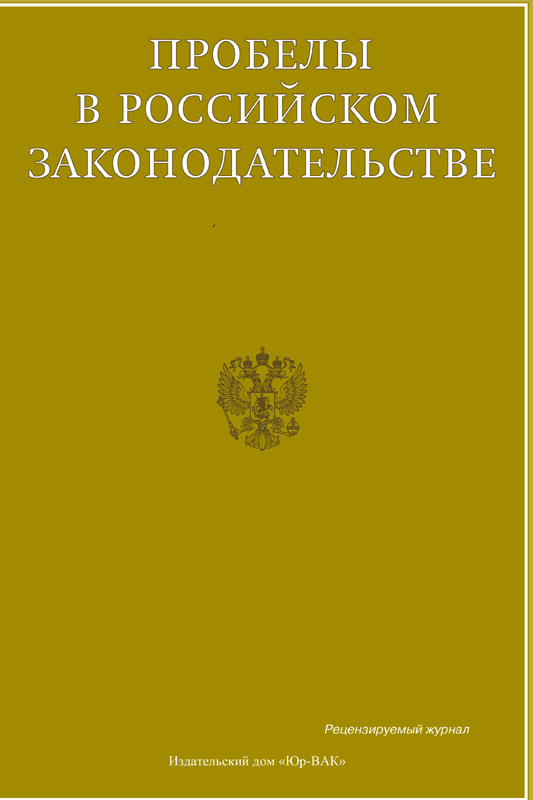Information Security as an Object of Protection Under Criminal Law
- 作者: Kazakova V.A.1,2
-
隶属关系:
- Institute of International Law and Justice, Moscow State Linguistic University
- FGKU of the Research Institute of the Ministry of Internal Affairs of Russia
- 期: 卷 15, 编号 2 (2022)
- 页面: 112-117
- 栏目: Articles
- URL: https://journals.eco-vector.com/2072-3164/article/view/531579
- ID: 531579
如何引用文章
详细
The purpose of the study. The article is devoted to the problems of ensuring information security by criminal law means. Various aspects of the concept of "information", "knowingly false information", "publicly significant information" and criminal law prohibitions on its dissemination are considered. The public danger of the spread of "fakes" in the conditions of the information war against Russia waged by foreign countries is stated. The innovations of the Criminal Code of the Russian Federation of 2020 and 2022 concerning the newly introduced articles 2071, 2072, 2073 of the Criminal Code of the Russian Federation are analyzed. The confusion of concepts used by legislators in the norms under consideration, including the classification signs of deliberately false information, and the interpretation of the social significance of information are criticized. A comparison with the administrative prohibitions formulated in the article of the Code of Administrative Offenses of the Russian Federation “Abuse of the freedom of the mass media” is made. Signs of delimitation of criminal and administrative responsibility for the dissemination of "fake" news are revealed. By applying the methods of system analysis, comparative jurisprudence, formal legal analysis of the texts of legislative acts, grammatical and logical interpretation, the presence of redundant norms and gaps in modern criminal legislation associated with the onset of a new social reality - the information war are stated. Conclusion: By applying the methods of system analysis, comparative jurisprudence, formal legal analysis of the text, grammatical and logical interpretation, the presence of gaps in modern criminal legislation associated with the onset of a new social reality are stated. Recommendations on the formulation of a universal criminal law prohibition of the dissemination of knowingly false socially significant information are given.
全文:
作者简介
Vera Kazakova
Institute of International Law and Justice, Moscow State Linguistic University; FGKU of the Research Institute of the Ministry of Internal Affairs of Russia
Email: vera1313@yandex.ru
Dr.Sci.(Law), Professor, Head of Criminal Law Department; Chief Researcher of the 3rd Department of SIC-3 Moscow, Russian Federation
参考
- Butkevich S.A. Fake news and media: problems of differentiation and penalization // Jurist-Pravoved. 2021. No. 2 (97). pp. 74-79.
- Galyashina, E.I. "Faking" as a new threat to media security: the Linguistic and Legal aspect of Ethnopsycholinguistics. 2021. No. 2 (5). pp. 7-24.
- Devdariani N.V., Rubtsova E.V. A retrospective analysis of the origin of the term "fake news" // Baltic Humanitarian Journal. 2020. Vol. 9. No. 3 (32). pp. 249-252.
- Dubovichenko S.V., Karlov V.P. Criminal liability for the public dissemination of deliberately false information (Articles 2071, 2072 of the Criminal Code of the Russian Federation) // Bulletin of the V.N. Tatishchev Volga State University. 2020. Vol. 1. No. 3 (96). pp. 154-163.
- Inshakov S.M. Hybrid war in the system of military threats to national security. M. 2018.
- Koshkarova, N.N., Boyko, E.S. (2020). Fake, I know you: linguistic mechanisms for recognizing false information. Political linguistics, 2(80), 77-82. doi: 10.26170/pl20-02-08. Retrieved from: https://www.elibrary.ru/item.asp?id=42767650
- Neznamova Z. A. Ensuring personal information security by means of criminal law (crimes against the person). Criminalist. 2019. No. 1 (26). pp. 34-40.
- Sukhodolov A.P. (2017). The phenomenon of «fake news» in the modern media space. Eurasian Cooperation: Humanitarian Aspects: Materials of Intern. scientific-practical conf. (pp. 93-112). Irkutsk. Retrieved from: https://www.elibrary.ru/item.asp? id=32574561
补充文件








